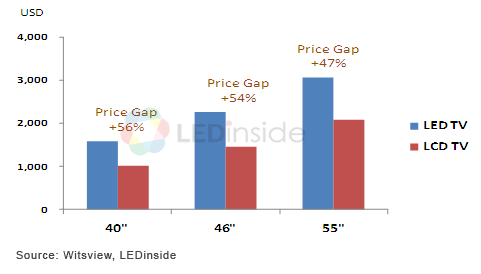

Jan 26th, 2010------ TV brand vendors are highly optimistic about the shipments of LED TVs in 2010, indicated research institute LEDinside. The optimism boosts demand for LEDs and rapidly increases LED supply. Therefore, under the substantial expansion of LED manufacturing capacity, end-market sales of LED TV will be the determining factor in whether the LED industry will be able to sustain its growth momentum in the second half of the year.
Since the fourth quarter of 2009, individual TV brand vendors have been aggressively promoting ultra-slim and energy-saving LED TVs. An optimistic forecast shows that LED TV shipments will reach over 30 million sets in 2010, a tenfold increase compared to that of 2009.
According to LEDinside’s statistics, each LED TV requires an average of 300 ~ 400 LEDs, and each MOCVD system can supply approximately 200,000 LED TVs per year. Therefore, it takes the capacity of around 150 MOCVDs to supply LEDs required for 30 million LED TVs. The global MOCVD shipments in 2009 were about 260 sets; and in 2010, it could increase to 500 sets or more, especially from the strong expansion in China. Even though not all expansion of the production capacity is allocated for LED TVs, the significant expansion of the production capacity is a major variable for the supply and demand of LED industry in second half of the year.
Based on surveys from Witsview, a TFT-LCD industry research institute, retail prices of LED TVs declined in January 2010. The average retail price of LED TV fell by 5.7%, which is more substantial compared to the 1.6% drop in that of LCD TV. Despite the price decline in LED TVs, they still cost 1.5 times that of the traditional LCD TV.
As a result, the retail price of LED TV is the key influencing factor in the overall penetration rate of LED TV, noted LEDinside. TV brand venders need to reduce the retail price substantially in order to reach the target of 30 million sets.
Chart -1 LED TV and LCD TV retail price gap

Subject
Related Articles
Related Reports

